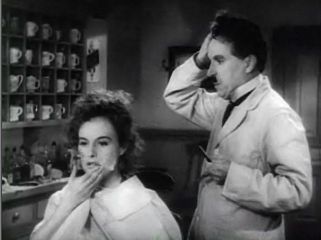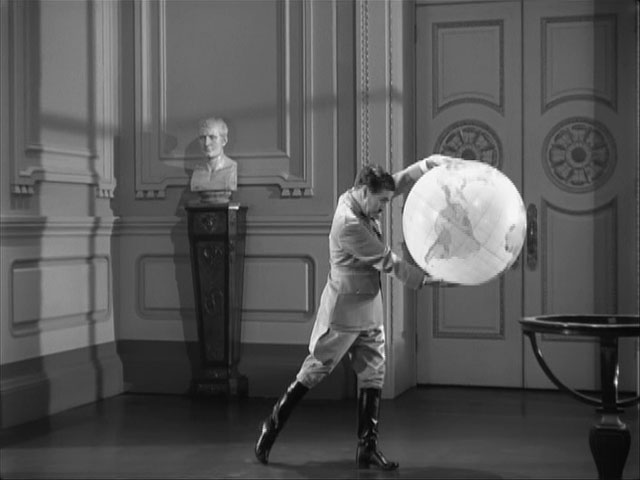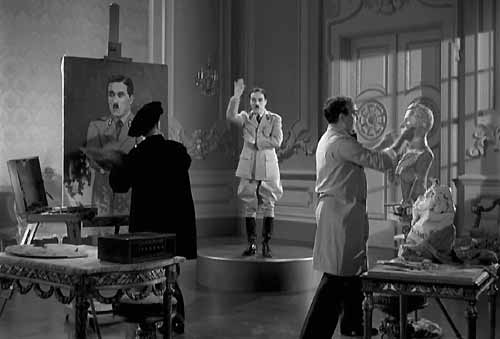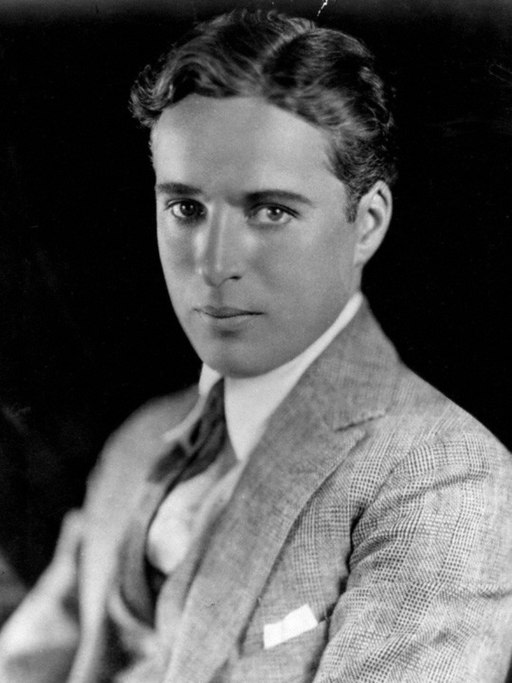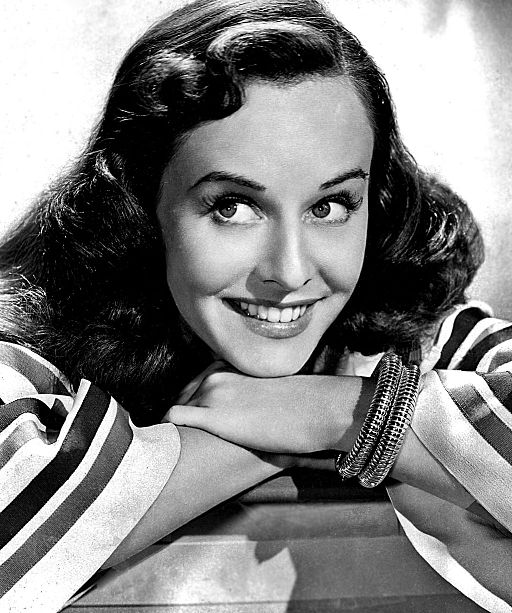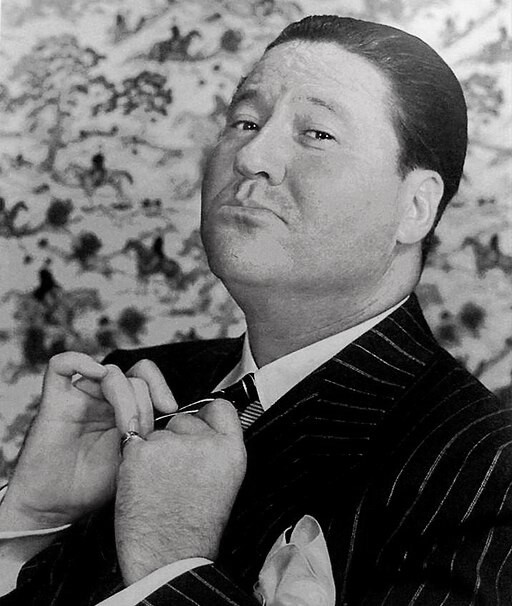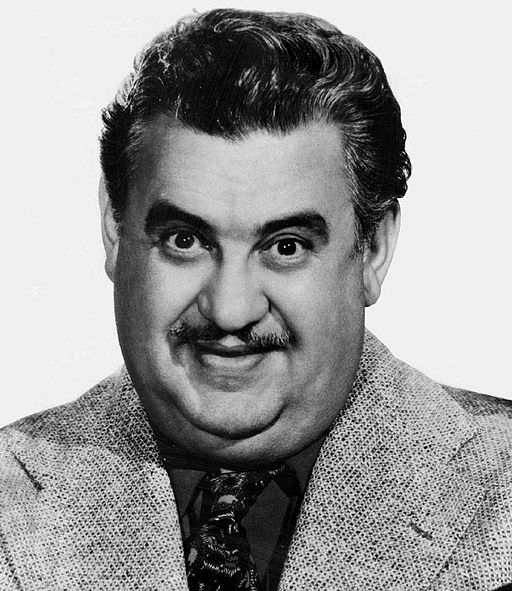The Great Dictator - 1940
back| Released by | United Artists |
| Director | Charlie Chaplin |
| Producer | Charlie Chaplin |
| Script | Charlie Chaplin |
| Cinematography | Karl Struss and Roland Totheroh |
| Music by | Meredith Willson, with Chaplin contributing to the score |
| Running time | 125 minutes |
| Film budget | $2 million |
| Box office sales | $5 million |
| Main cast | Charlie Chaplin - Paulette Goddard - Jack Oakie - Reginald Gardiner - Henry Daniell - Billy Gilbert |
The Great Dictator
The Ultimate Plea for Humanity and Peace
"The Great Dictator" is renowned for being Chaplin's first true sound film and stands out for its bold satire of fascism, Adolf Hitler, and the political climate of the era.
The film was both a critical and commercial success, noted for its blend of comedy, social commentary, and Chaplin's memorable dual performance.
Related
The Great Dictator – 1940
Overview and Analysis
"The Great Dictator," directed by Charlie Chaplin, is a satirical film that boldly addresses the political climate of its time, particularly the rise of fascism and totalitarian regimes.
Summary
- Setting: The film is set in a fictional country, Tomania, resembling Nazi Germany.
- The Dual Roles: Chaplin plays two characters — a Jewish barber and Adenoid Hynkel, the dictator of Tomania, who is a parody of Adolf Hitler.
- The Barber's Story: The Jewish barber, serving in the Tomanian army during World War I, loses his memory in an accident. Years later, he returns to his ghetto unaware of the political changes and Hynkel's oppressive regime against the Jews.
- Rise of Hynkel: Meanwhile, Hynkel, a comically inept dictator, dreams of world domination. He oppresses Jews and plans to invade the neighboring country of Osterlich.
- Resistance and Love: In the ghetto, the barber meets Hannah and becomes involved in resisting Hynkel's regime. His resemblance to Hynkel is a crucial plot element.
- The Napaloni Encounter: A subplot involves Hynkel's interactions with Benzino Napaloni, the dictator of Bacteria, a parody of Mussolini. This includes comical power struggles, highlighting the absurdity of such dictators.
- Mistaken Identity: The barber is mistaken for Hynkel, leading to the film's climax.
Analysis
Themes:
- Anti-Fascism: The film satirizes fascist dictators, notably Hitler and Mussolini, critiquing their megalomania and cruelty.
- Humanity and Hope: Despite its satirical tone, the film conveys a message of hope and the triumph of the human spirit over oppression.
Stylistic Elements:
- Comedy and Satire: Chaplin uses slapstick, verbal wit, and situational comedy to both entertain and criticize.
- Dramatic Speech: The film is notable for Chaplin's final speech, where he steps out of character to deliver a passionate plea for peace and humanity.
Cinematic Techniques:
- Dual Role: Chaplin's performance as both the dictator and the barber showcases his versatility and serves as a powerful contrast between tyranny and kindness.
- Visual Comedy: The film employs visual gags, such as the globe dance scene, symbolizing Hynkel's delusional grasp for world domination.
Cultural Impact:
- "The Great Dictator" was groundbreaking for its direct criticism of Hitler, released before the U.S. entered World War II.
- The film's blend of humor and serious commentary was unique for its time and continues to influence satirical works.
- "The Great Dictator" stands as a testament to Chaplin's genius in using comedy to tackle serious and relevant themes. It remains a significant cultural artifact, reflecting the artistic and political landscape of the early 1940s while delivering a timeless message about the importance of empathy and the human spirit.
Final Speech from "The Great Dictator":
Full Cast of “The Great Dictator”:
Main Cast:
- Charlie Chaplin - Playing dual roles as:
- Adenoid Hynkel (Dictator of Tomania)
- A Jewish Barber
- Paulette Goddard - Hannah
- Jack Oakie - Benzino Napaloni (Dictator of Bacteria)
- Reginald Gardiner - Commander Schultz
- Henry Daniell - Garbitsch
- Billy Gilbert - Field Marshal Herring
Supporting Cast:
- Maurice Moscovitch - Mr. Jaeckel
- Emma Dunn - Mrs. Jaeckel
- Bernard Gorcey - Mr. Mann
- Paul Weigel - Mr. Agar
- Chester Conklin - Barber's Customer
- Esther Michelson - Jewish Woman
- Hank Mann - Storm Trooper Stealing Fruit
- Florence Wright - Madame Napaloni
- Carter DeHaven - Spook
- Eddie Gribbon - Tomanian Storm Trooper
- Rudolph Anders - Tomanian Officer (credited as Robert O. Davis)
- Leyland Hodgson - Club Secretary
- Nita Pike - Secretary
- George Lynn - Commander of Storm Troopers (credited as Peter Lynn)
- Grace Hayle - Madame Napaloni's Friend
Analysis of the Direction of Charlie Chaplin:
Charlie Chaplin's direction in "The Great Dictator" is a masterclass in blending satire, social commentary, and emotional depth. Here's an analysis of his directorial approach:
Visionary Satire
- Bold Subject Matter: Chaplin daringly chose to satirize Adolf Hitler and fascism at a time when the full extent of Nazi atrocities was not yet globally known. His decision to make a comedy that mocked a then-current and very real threat was both audacious and prescient.
- Dual Roles: Chaplin's decision to play both the Jewish barber and the dictator Hynkel was a stroke of genius. This allowed him to directly contrast the humanistic values embodied by the barber with the megalomania of Hynkel, effectively criticizing the absurdity and horror of dictatorship.
Comedic Genius
- Physical Comedy: As a master of silent film, Chaplin brought his exceptional skill in physical comedy to "The Great Dictator." His meticulous direction in scenes, like the globe dance and the barber's clumsy antics, showcased his ability to communicate complex ideas through purely visual means.
- Timing and Pacing: Chaplin's direction excelled in comic timing. He knew precisely how to pace scenes for maximum comedic effect, allowing moments of humor to unfold naturally and with impact.
Emotional Depth
- Humanizing the Story: Amidst the satire, Chaplin infused the narrative with a deep sense of humanity. His portrayal of life in the Jewish ghetto, the struggles of the characters, and the moments of kindness amidst despair added layers of emotional depth.
- The Final Speech: Perhaps the most significant directorial decision was the final speech, where Chaplin breaks the fourth wall. This poignant and impassioned plea for humanity, democracy, and peace transcends the film's narrative, delivering a timeless message that still resonates today.
Cinematic Techniques
- Mise-en-Scène: Chaplin's attention to detail in the set design, costumes, and overall staging created a visually compelling and historically resonant world. The contrast between the opulent world of Hynkel and the impoverished ghetto was stark and symbolic.
- Use of Sound: Though known for his silent films, Chaplin adeptly transitioned to sound with this film. His use of speeches, background noises, and the film's score enhanced the narrative impact and satirical elements.
Cultural and Political Impact
- Risk-Taking: Chaplin took a significant risk by making this film, both in terms of its political content during a tense pre-World War II atmosphere and in stepping away from his beloved Tramp character.
- Influence and Legacy: The film had a profound impact on both audiences and filmmakers, showing that comedy could be used to tackle serious, contemporary issues. It remains a benchmark for political satire in cinema.
In conclusion, Charlie Chaplin's direction in "The Great Dictator" is a testament to his artistic courage, visionary storytelling, and his deep understanding of cinema's power to influence and inspire. Through a blend of satire, humor, and emotional depth, he created a film that not only addressed the critical issues of his time but also left a lasting legacy in the world of filmmaking.
Notable Quotes from “The Great Dictator”:
Hynkel's Speeches:
- "Democracy is fragrant. Liberty is odious. Freedom of speech is objectionable." These lines satirize the nonsensical and contradictory nature of dictatorships and their propaganda.
The Jewish Barber's Speech (often referred to as the "Final Speech"):
- "I’m sorry, but I don’t want to be an emperor. That’s not my business. I don’t want to rule or conquer anyone. I should like to help everyone if possible; Jew, Gentile, black man, white."
- "We all want to help one another. Human beings are like that. We want to live by each other’s happiness, not by each other’s misery."
- "The aeroplane and the radio have brought us closer together. The very nature of these inventions cries out for the goodness in men, cries out for universal brotherhood, for the unity of us all."
- "You, the people, have the power to make this life free and beautiful, to make this life a wonderful adventure." These lines from the barber’s impassioned plea for peace, democracy, and human unity are among the most famous in film history.
Dialogue Between the Barber and Hannah:
- Hannah: "I’ll never forget you."
- Barber: "You’ll find someone else."
- Hannah: "But I don’t want someone else." This exchange reflects the personal, human element of the story amidst the broader political satire.
Comments on Dictatorship:
- "Dictators free themselves but they enslave the people!" This line encapsulates the film’s critical stance on dictatorship and tyranny.
Hynkel's Absurdity:
- "This is a pretzel of the highest order!" This is an example of the nonsensical and absurd humor used to ridicule dictators like Hitler.
Charlie Chaplin’s Performance:
Charlie Chaplin's performance in "The Great Dictator" is a testament to his extraordinary talent and versatility as an actor. Here is an analysis of his performance in the dual roles of the Jewish barber and the dictator Adenoid Hynkel:
As the Jewish Barber
- Subtlety and Empathy: In the role of the barber, Chaplin exhibits a gentle, empathetic demeanor. His performance is marked by subtlety and warmth, capturing the essence of an ordinary man caught in extraordinary circumstances. This character is reminiscent of Chaplin's iconic Tramp, embodying vulnerability and resilience.
- Physical Comedy: Despite the role being more subdued than the Tramp, Chaplin's mastery of physical comedy is evident. His scenes in the barber shop, particularly the shaving sequence timed to Brahms' Hungarian Dance No. 5, showcase his impeccable timing and expressive body language.
- Emotional Depth: Chaplin brings a depth of emotion to the barber, particularly in scenes that reflect the character's confusion and distress in a changed world. His interactions with Hannah and other characters in the ghetto are tender and heartfelt, conveying a sense of hope amidst despair.
As Adenoid Hynkel
- Satirical Portrayal: Chaplin's portrayal of Hynkel is a brilliant exercise in satire. He exaggerates every aspect of the dictator's personality - his pomposity, his vanity, and his absurdity. This caricature serves as a powerful tool for ridiculing totalitarian leaders like Hitler.
- Expressive Facial Expressions and Gestures: Chaplin uses exaggerated facial expressions and bombastic gestures to great effect. His parody of Hitler's oratory style, complete with nonsensical gibberish and wild gesticulations, is both hilarious and cuttingly critical.
- The Globe Scene: One of the most iconic scenes is Hynkel playing with a globe balloon, which Chaplin performs with a blend of comic absurdity and tragic poignancy. It symbolizes Hynkel's (and by extension, Hitler's) megalomania and delusional aspirations for world domination.
The Contrast Between the Two Roles
- Dichotomy of Characters: Chaplin's ability to play two drastically different characters in the same film demonstrates his remarkable range as an actor. The stark contrast between the compassionate barber and the tyrannical Hynkel highlights the film's underlying message about the power of kindness over cruelty.
- Final Speech: The climax of the film, where the barber is mistaken for Hynkel, showcases Chaplin's dramatic abilities. His speech, delivered with passion and intensity, transcends the film's narrative and speaks directly to the audience, advocating for humanity and peace.
Conclusion
Chaplin's performance in "The Great Dictator" is not only a highlight of his career but also a significant achievement in the history of cinema. He uses his dual roles to effectively convey a powerful political and humanitarian message. Through his exceptional skill in both comedy and drama, Chaplin transforms the film into a poignant satire that remains relevant and influential decades after its release.
Awards and Recognition:
Academy Awards (Oscars)
- Nominated for Best Picture
- Nominated for Best Actor in a Leading Role (Charlie Chaplin, for his dual role)
- Nominated for Best Writing, Original Screenplay (Charlie Chaplin)
- Nominated for Best Supporting Actor (Jack Oakie as Benzino Napaloni)
- Nominated for Best Music, Original Score (Meredith Willson)
Other Recognitions
- While "The Great Dictator" did not win any of the Oscars it was nominated for, the film was widely acclaimed and is now considered a classic for its bold satire of fascism and its blend of comedy and political commentary.
- The film was particularly notable for its risk-taking approach, given the tense political climate at the time of its release.
- Over time, "The Great Dictator" has received numerous accolades and has been included in various lists of the greatest films ever made. It's celebrated for its historical significance, Chaplin's performance, and its powerful message.
Legacy
- The legacy of "The Great Dictator" goes beyond formal awards and nominations. It is remembered for its impact on cinema and society, its artistic bravery, and its poignant critique of dictatorship and war.
- The film is often cited in discussions about the role of art and satire in political commentary, and Chaplin's closing speech is frequently referenced for its emotive appeal for peace and humanity.




